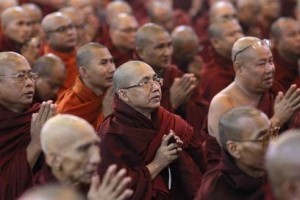“National Race Protection Law” Protects No One
By Burma Partnership • July 1, 2013 At a convention of over 1,500 monks from around the country in Rangoon on 27 June, senior Buddhist monks said that they endorse a draft law that would place restrictions on marriages between Buddhist women and non-Buddhist men, ostensibly “to protect our race and religion.”
At a convention of over 1,500 monks from around the country in Rangoon on 27 June, senior Buddhist monks said that they endorse a draft law that would place restrictions on marriages between Buddhist women and non-Buddhist men, ostensibly “to protect our race and religion.”
The proposed “national race protection law” states that non-Buddhist men wishing to marry a Buddhist woman would have to convert to her religion. They must also obtain permission from the woman’s parents and local authorities before marrying or risk 10 years in jail.
The proposed bill is in clear violation of the Universal Declaration of Human Rights (UDHR), which states in Article 16(1) that, “Men and women of full age, without any limitation due to race, nationality or religion, have the right to marry and to found a family.”
The bill also violates the Convention to Eliminate All Forms of Discrimination Against Women (CEDAW). Article 16(1) of CEDAW states:
State Parties shall take all appropriate measures to eliminate discrimination against women in all matters relating to marriage and family relations and in particular shall ensure, on a basis of equality of men and women:
(a) The same right to enter into marriage;
(b) The same right freely to choose a spouse and to enter into marriage only with their free and full consent;
Supporters of this bill hold alarming views of women: Aung Myaing, chairperson of the Theravada Dharma Network, a Burmese religious network, said, “Our Buddhist women are not intelligent enough to protect themselves.” A statement by 9 women’s groups in Burma criticized the bill as being “an insult to women’s ability of reasoning.”
One of the monks attending the convention last week, Ashin Wimala Buddhi from Moulmein’s Mya Sadi monastery, went so far as to threaten politicians who may oppose the bill, saying, “I would want to know which representatives turn down the national race protection law when it is proposed [in parliament] – I will make it so that they get no votes in 2015.”
The monks who are tabling the national race protection law and their supporters insist that it is a means to resolve ongoing tensions in Burma. However, it is clear from their disturbing comments that this bill is more likely to foment divisions and hostilities.
Worryingly, the government has expressed its support for Ashin Wirathu. In his public speech in response to the TIME Magazine cover story about the monk, President Thein Sein called Ashin Wirathu a “son of Buddha” and defended him as a “noble person” committed to peace. The Minister of Religious Affairs has a similarly distorted sense of reality. Sann Sint told Reuters, “Wirathu’s sermons are about promoting love and understanding between religions. It is impossible he is inciting religious violence.”
In an interfaith meeting held on the same day as the monks’ convention, leaders representing Christians, Muslims, and Buddhists, expressed concerns about the draft law and affirmed that peace is the only way forward for the country. Archbishop Charles Bo said that, “no religion promotes hatred” and that it is the task of leaders and representatives of various faiths “to refrain from speech that fosters hatred, targets someone because of their faith, causes damage or injury, affects specific groups.” It is imperative for leaders and communities to heed this message of genuine peace, for the sake of national reconciliation and transition towards a truly democratic country that respects the rights of all its peoples equally.
The government of Burma has a specific obligation as a signatory to CEDAW to protect the rights of women in the face of such a chauvinist law. Similarly, Members of Parliament must not give in to threats from extremist monks but reject any draft law that does not protect the fundamental human rights of all the people of Burma, including religious minorities and women.
Tags: Burma Partnership, CEDAW, National Race Protection Law, Universal Declaration of Human RightsThis post is in: Blog
Related PostsBurma Partnership Celebrates Continuing Regional Solidarity for Burma and Embraces the Work Ahead for Progressive Voice
Burma Army Displays Blatant Disregard for 21st Century Panglong Peace Process
Ann Din Coal Power Plant: Local Movement and Action to Preserve and Protect Natural Resources and Land: Mon IDP Report Case Study #4
Latest Human Rights Abuse Case Demonstrates Urgent Need to Reform the Myanmar National Human Rights Commission
Human Rights Far From Guaranteed as US Sanctions on Burma Are Removed









 All posts
All posts